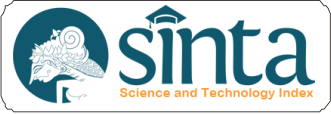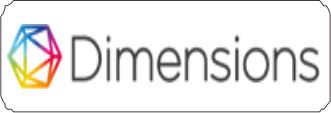The Influence of Achievement Motivation and Self-Regulated Learning (SRL) on Students’ Mathematics Learning Outcomes
Keywords:
Achievement Motivation, Self-Regulated Learning, Mathematics Learning Outcomes
Abstract
This study explores the significance of influence of achievement motivation and SRL toward students’ mathematics learning outcomes. This was an ex post facto research. The population was all tenth-grade students of MAN 2 Samarinda, West Kalimantan, Indonesia in the school year 2013/2014. The sample was selected by cluster sampling, as well as obtained four classes as a sample. The data were collected by questionnaires of achievement motivation and SRL, and math formative test. Furthermore, the data were analyzed by using multiple regression analysis. The results of this study is the assumption of regression equation Ŷ = -21,682 + 0,400X1 + 0,239X2 with F value is 40,043 and the significance is 0,000. Hence, there is a significant combination of achievement motivation and SRL through students’ mathematics achievement.References
Chambers, P. (2008). Teaching mathematics: developing as areflective secondary teacher. London: SAGE Publication
Construction of tests for its measurement: a review of the main trends. Psicolofica Bulletin, 22, 43-66
Djaali. (2013). Psikologi Pendidikan. Jakarta: Bumi Aksara
Ebel, R. L., & Frisbie, D. A., (1991). Essentials of educational measurement (5th ed.). Engelwood Cliffs, New Jersey: Prentice Hall.
Friedman. (2006). Kerpibadian teori klasik dan riset modern. Jakarta: Erlangga
Glynn, S. M., Aultman, L.P., & Owens, A. M. (2005). Motivation to learn in general education programs. The Journal of General of Education, 54 (2), 150-170
Hook, P. Dan Vass, A. (2001). Creating winning classroom. London, UK: David Fullon Publisher
Jossberger, H. (2011). Toward self regulated learning in vocational education: difficulties and opportunities. Heerlen: Universitaire Pers Maastricht.
Kasmayadi. W. (2016). Model asesmen pengembangan keprofesian berkelanjutan guru sekolah menengah atas. Disertasi doktor, tidak diterbitkan, Universitas Negeri Yogyakarta, Yogyakarta.
Labuhn, A. S., Zimmermann, B. J., & Hasselhorn, M. (2010). Enhancing studnets’ self-regulation and mathematics performance: the influence of feedback and self-evaluative standars. Metacognition learning, 173-194
Middleton, J. A. & Spanias, P. A, (1999). Motivation for achievement in mathematics: findings, generalizations, and criticism of the research. Journal for research in mathematics education, 30(1), 65-88.
Moos, D. C., & Ringdal, A. (2012). Self regualted learning in the classroom: a literature review on the teacher’s role. Education Research International, 1- 15
Sukmadinata, N, S. (2005). Landasan Psikologi Proses Pendidikan. Bandung: Remaja Rosdakarya
National Council of Teachers of Mathematics. (1989). Curriculum and evaluation standards for school mathematics. Reston, VA: Author.
Odogwu, H.N. (1994). Primary Secondary Teachers and the Teaching of time Concept in Schools. Education Today, 7(2).
Paris, S. G., & Paris, A. H. (2001). Classroom applications of research in self regulated learning. Educational Psychologist.
Parkay, F.W.,& Stanford, B.H. (2010). Becoming a teacher. London, UK: Pearson Education Ltd.
Pintrich, P. R. (2000). The role of goal orientation in self-regulated learning. In M. Boekaerts, P. R. Pintrich, ?& M. Zeidner (Eds.), Handbook of self-regulation (pp. 452-502). New York: Academic Press.
Pintrich, P. R., & De Groot, E. V. (1990). Motivational and self-regulated learning components of classroom academic performance. Journal of Educational Psychology, 82, 40.
Pratt, M. W., Green, D., MacVicar, J., & Bountrogianni. (1992). The mathematical parent: parental scaffolding, parenting style, and learning outcomes in long-division mathematics homework. The journal of applied developmental psychology, 13, 17-34
Santrock, J.W. (2011). Educational Psychology (5th ed). New York: McGraw-Hill
Schunk, D.H. Pintrick, P.L. & Meecee, J. L. (2010). Motivation in education, Theory, research, and application. London. Pearson Merril Prentice Hall
Sengul, S. (2011). Effects of concept cartoons on mathematics self efficacy of grade 7th grade students. Educational Sciences: Theory & Practice-11(4). 2305-2313.
Tella. (2007). The Impact of Motivation on Student’s Academic Achievement and Learning Outcomes in Mathematics among Secondary School Students in Nigeria. Eurasia Journal of Mathematics, Science & Technology Education, 2007, 3(2), 149-156
Woolfolk, A. (1009). Educational psychology active (learning edition), (terjemahan Helly P. J., & Sri M. S). Retrieved from http://www.perasonhighered.com/samplechapter/0205435297.pdf in Desember, 2014
Woolfolk, A. E. (2004). Educational Psychology (10th ed). Boston: Pearson Education, Inc.
Zimmerman, B. J. (1989). A sosial cognitive view of self-regulated academic learning. Journal of education psychology, 81, 329-32=39
Zimmerman, B. J. (1990). Self regulated learning and academic achievement: an overview. Educational psychologist, 25 (1), 3-17
Zimmerman, B. J., & Martinez-Pons, M. (1986). Developement of a stryctured interview for assessing students’ use of self-regulated learning strategies. American Educational Research Journal, 23, 614-628
Construction of tests for its measurement: a review of the main trends. Psicolofica Bulletin, 22, 43-66
Djaali. (2013). Psikologi Pendidikan. Jakarta: Bumi Aksara
Ebel, R. L., & Frisbie, D. A., (1991). Essentials of educational measurement (5th ed.). Engelwood Cliffs, New Jersey: Prentice Hall.
Friedman. (2006). Kerpibadian teori klasik dan riset modern. Jakarta: Erlangga
Glynn, S. M., Aultman, L.P., & Owens, A. M. (2005). Motivation to learn in general education programs. The Journal of General of Education, 54 (2), 150-170
Hook, P. Dan Vass, A. (2001). Creating winning classroom. London, UK: David Fullon Publisher
Jossberger, H. (2011). Toward self regulated learning in vocational education: difficulties and opportunities. Heerlen: Universitaire Pers Maastricht.
Kasmayadi. W. (2016). Model asesmen pengembangan keprofesian berkelanjutan guru sekolah menengah atas. Disertasi doktor, tidak diterbitkan, Universitas Negeri Yogyakarta, Yogyakarta.
Labuhn, A. S., Zimmermann, B. J., & Hasselhorn, M. (2010). Enhancing studnets’ self-regulation and mathematics performance: the influence of feedback and self-evaluative standars. Metacognition learning, 173-194
Middleton, J. A. & Spanias, P. A, (1999). Motivation for achievement in mathematics: findings, generalizations, and criticism of the research. Journal for research in mathematics education, 30(1), 65-88.
Moos, D. C., & Ringdal, A. (2012). Self regualted learning in the classroom: a literature review on the teacher’s role. Education Research International, 1- 15
Sukmadinata, N, S. (2005). Landasan Psikologi Proses Pendidikan. Bandung: Remaja Rosdakarya
National Council of Teachers of Mathematics. (1989). Curriculum and evaluation standards for school mathematics. Reston, VA: Author.
Odogwu, H.N. (1994). Primary Secondary Teachers and the Teaching of time Concept in Schools. Education Today, 7(2).
Paris, S. G., & Paris, A. H. (2001). Classroom applications of research in self regulated learning. Educational Psychologist.
Parkay, F.W.,& Stanford, B.H. (2010). Becoming a teacher. London, UK: Pearson Education Ltd.
Pintrich, P. R. (2000). The role of goal orientation in self-regulated learning. In M. Boekaerts, P. R. Pintrich, ?& M. Zeidner (Eds.), Handbook of self-regulation (pp. 452-502). New York: Academic Press.
Pintrich, P. R., & De Groot, E. V. (1990). Motivational and self-regulated learning components of classroom academic performance. Journal of Educational Psychology, 82, 40.
Pratt, M. W., Green, D., MacVicar, J., & Bountrogianni. (1992). The mathematical parent: parental scaffolding, parenting style, and learning outcomes in long-division mathematics homework. The journal of applied developmental psychology, 13, 17-34
Santrock, J.W. (2011). Educational Psychology (5th ed). New York: McGraw-Hill
Schunk, D.H. Pintrick, P.L. & Meecee, J. L. (2010). Motivation in education, Theory, research, and application. London. Pearson Merril Prentice Hall
Sengul, S. (2011). Effects of concept cartoons on mathematics self efficacy of grade 7th grade students. Educational Sciences: Theory & Practice-11(4). 2305-2313.
Tella. (2007). The Impact of Motivation on Student’s Academic Achievement and Learning Outcomes in Mathematics among Secondary School Students in Nigeria. Eurasia Journal of Mathematics, Science & Technology Education, 2007, 3(2), 149-156
Woolfolk, A. (1009). Educational psychology active (learning edition), (terjemahan Helly P. J., & Sri M. S). Retrieved from http://www.perasonhighered.com/samplechapter/0205435297.pdf in Desember, 2014
Woolfolk, A. E. (2004). Educational Psychology (10th ed). Boston: Pearson Education, Inc.
Zimmerman, B. J. (1989). A sosial cognitive view of self-regulated academic learning. Journal of education psychology, 81, 329-32=39
Zimmerman, B. J. (1990). Self regulated learning and academic achievement: an overview. Educational psychologist, 25 (1), 3-17
Zimmerman, B. J., & Martinez-Pons, M. (1986). Developement of a stryctured interview for assessing students’ use of self-regulated learning strategies. American Educational Research Journal, 23, 614-628










